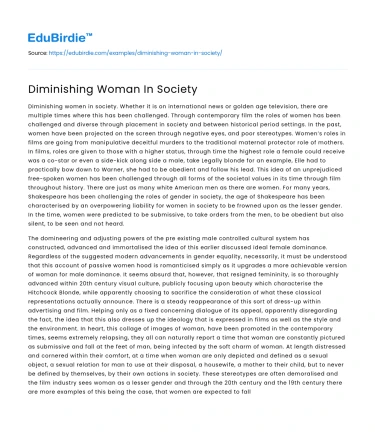Introduction
In recent decades, substantial progress has been made toward gender equality. However, the notion of the diminishing role of women in society remains a critical issue that warrants further exploration. Historically, women have been marginalized, relegated to secondary roles, and denied opportunities for advancement. Despite advancements in education and the workforce, systemic barriers continue to impede women's full participation in societal functions. This essay aims to examine the underlying factors contributing to the diminishing role of women in society, analyze the repercussions of these trends, and explore potential strategies for empowerment. By understanding both the historical context and contemporary challenges, we can better address the persistent inequalities that undermine gender parity.
Historical Context and Societal Expectations
Throughout history, societal expectations have significantly influenced the roles of women, often limiting their opportunities to contribute equally alongside men. In many cultures, women have traditionally been expected to fulfill domestic responsibilities, a concept deeply embedded in patriarchal norms. According to Simone de Beauvoir, "One is not born, but rather becomes, a woman," highlighting how societal structures shape female identities and roles. Despite the enfranchisement and increased access to education, many women still encounter cultural and institutional resistance that restricts their economic and political involvement.
Save your time!
We can take care of your essay
- Proper editing and formatting
- Free revision, title page, and bibliography
- Flexible prices and money-back guarantee
For instance, in many developing countries, educational opportunities for girls are limited due to socio-economic constraints and cultural biases prioritizing boys' education. The World Bank reports that over 130 million girls worldwide are out of school, a statistic that underscores the challenges women face in securing equitable education. Moreover, traditional gender roles have pervasive effects, often discouraging women from pursuing careers in male-dominated fields such as science, technology, engineering, and mathematics (STEM). The consequence is a gender gap that perpetuates a cycle of dependency, where women's contributions are undervalued and their potential underestimated.
To transition to a more equitable society, it is essential to challenge these entrenched norms and provide women with equal opportunities. This requires comprehensive policy interventions, community engagement, and a commitment to reshaping societal perceptions. By addressing these historical and cultural barriers, we can pave the way for more significant female participation in all sectors of society.
Contemporary Challenges and Systemic Barriers
In the contemporary landscape, women continue to encounter systemic barriers that diminish their roles in society. Despite legal frameworks advocating for gender equality, practical obstacles remain. The workplace remains a significant arena where women face discrimination, wage gaps, and limited opportunities for leadership roles. According to a report by McKinsey & Company, women hold only 25% of senior management positions globally, reflecting the persistent glass ceiling that impedes their progression.
Additionally, women often bear the double burden of professional and domestic responsibilities. The concept of the "second shift," coined by sociologist Arlie Hochschild, describes the additional labor women perform at home after their professional workday. This dual obligation contributes to burnout and limits women's ability to advance in their careers. Furthermore, the COVID-19 pandemic has exacerbated these challenges, disproportionately affecting women who have had to balance increased caregiving responsibilities with professional demands.
Addressing these contemporary barriers requires a multifaceted approach. Organizations must implement inclusive policies that promote work-life balance and equal opportunities for advancement. Governments and institutions should enforce legislation that addresses wage disparities and supports women's career development. Simultaneously, societal attitudes toward gender roles need to evolve to support a more equitable division of labor both at home and in the workplace. By dismantling these systemic barriers, we can create an environment where women can fully realize their potential.
Empowerment Strategies and the Path Forward
Empowering women and enhancing their roles in society necessitate targeted strategies that address both individual and systemic challenges. Education is a critical tool in this endeavor, providing women with the knowledge and skills needed to pursue diverse opportunities. Initiatives that focus on girls' education, particularly in underserved communities, can have a transformative impact. For example, the Malala Fund has been instrumental in advocating for girls' education worldwide, emphasizing the importance of investing in female potential.
In addition to education, mentorship and networking opportunities play a crucial role in empowering women. By connecting women with role models and professional networks, they can gain the support and guidance necessary to overcome challenges and achieve their goals. Organizations like Lean In, founded by Sheryl Sandberg, offer platforms for women to share experiences, build confidence, and advocate for gender equality in the workplace.
Furthermore, addressing gender biases and promoting diversity in leadership positions can lead to more inclusive and innovative environments. Research by Catalyst indicates that companies with more women in leadership roles tend to perform better financially, demonstrating the value of diverse perspectives. By fostering environments where women can thrive, we can create a more equitable and prosperous society for all.
Conclusion
The diminishing role of women in society is a multifaceted issue rooted in historical, cultural, and systemic factors. Despite significant progress toward gender equality, barriers persist that limit women's full participation and contribution. Addressing these challenges requires comprehensive strategies that encompass education, policy reform, and cultural change. By empowering women through education and mentorship, promoting inclusive workplace policies, and challenging societal norms, we can pave the way for a more equitable future. As we move forward, it is crucial to recognize the value of women's contributions and work collectively to dismantle the barriers that hinder gender equality. Only then can we achieve a society where women have the opportunity to thrive and lead.






 Stuck on your essay?
Stuck on your essay?

